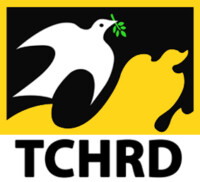Since the March 1959 Tibetan National Uprising, for almost 28 years the issue of Tibet remained a yet another isolated story closed to the International fora. Until, on 27 September 1988 the most contemporary protest took place. This was an awakening and the issue of Tibet came back to the attention of the world. This was made possible when a group of twenty one monks of Drepung Monastery and four lay people initiated the demonstration Ngawang Gyaltsen was one of them and since then they never looked back Today Ngawang is languishing in Drapchi prison, sentenced for 17 years, yet his spirit remains unabated.
Ngawang Gyaltsen lay name (Ngodup Gyaltsen) more commonly known as Tsewa Khampa is a 38 year old Drepung Monastery monk orignally from Toelung Dechen County. He was born in Songrapa. His parents are both in their 80’s and he has a brother.
On 27 September 1987, he actively participated in the demonstration against the Chinese. It was one of the most famous contemporary uprising where a total number of 25 men participated out of which 21 were monks of Drepung Monastery. He was arrested that same day. For four months till 21 January 198 She was held in Gutsa Detention Centre. While in Gutsa they were given such pathetic diet that they often threw away the food in the excrement pot. When prison officials saw it they would be infuriated and as part of punishment it would be cooked again and the prisoners would be compelled to eat again.
From his time of release on 21, January 1988 till 16 April 1989, he was a part of an organisation of ten who were actively involved in many pro-independence activities. The main activities this organisation dealt with were the distribution of speeches of His Holiness the Dalai Lama, a Tibetan version of the leaflets of the UN Declaration of Human Rights, and another document “Maong Pai Bod Kyi Mang Tsoi Tsa Khrim” (Future Democratic Constitution of Tibet).
Such political activities continued until he was caught for the second and the last time.
Ngawang’s intrepid act of uninterrupted freedom struggle aggravated the Chinese to a large extent. Ngawang was also caught for attempting to send the list of political prisoners of Tibet to India.
When Ngawang came to know that the Chinese officials were after him, he immediately made an attempt to flee Tibet in March 1989 with another monk, Kalsang Thutop. Unfortunately he was arrested on the border.
Ngawang was detained in Sangyip prison for six months after which he was sentenced to 17 years with five year deprivation of political rights by the People’s Court of “Tibet Autonomous Region” as the “accessory offender”. Along with him seven others were implicated and Kalsang Thutop was one of them. Ngawang was charged with “actively participating in criminal activities engaging in espionage, and illegally crossing the national border. He was also implicated for sending information about the violence in Lhasa out of the country.
According to Ngawang Woepar one of the participants of the September demonstration and who escaped in Dharamsala, India in 1991, the Chinese officials told all the monks who served four months in Gutsa that they would be liable to further implications if they continue to indulge in such political activities once they are released they would be dealt with most seriously.
Ngawang was later transferred to Drapchi Prison where he is currently serving his prison term. Ngawang is described by Ngawang Woepar as a head strong, determined person who would not change his mind once a decision has been made. Patriotism is one of his strong points and while he was in the monastery he was one of the best students. All age group in his health is beleived to have become weak apparently due to poor prison conditions.
Express your concern and support by addressing an appeal letter to the Chinese Premier, Mr Li Peng, requesting the Chinese authorities to release Ngawang Gyaltsen and all other political prisoners who continue to languish in Chinese prisons in Tibet. You may send it directly to the Chinese Embassy or send it to Tibetan Centre for Human rights and Democracy for forwarding.
